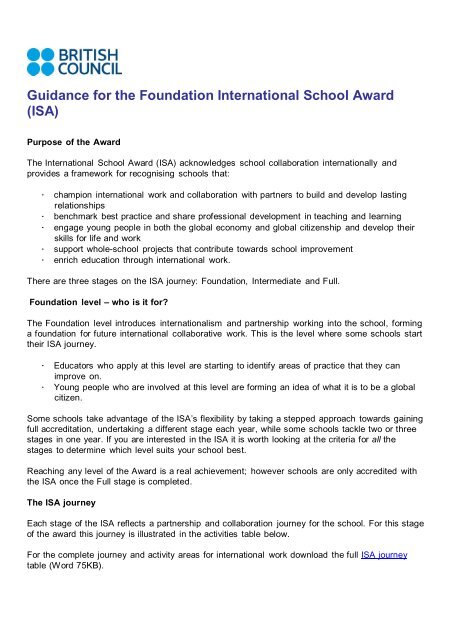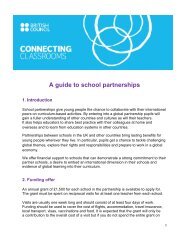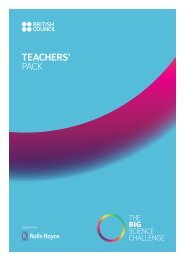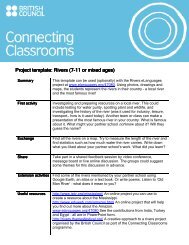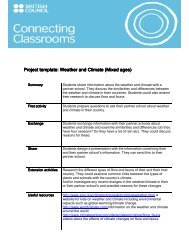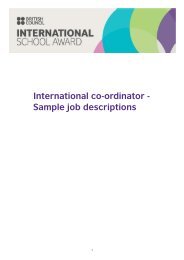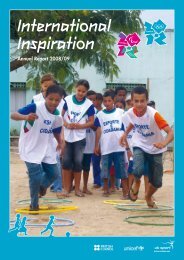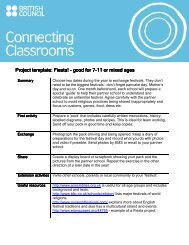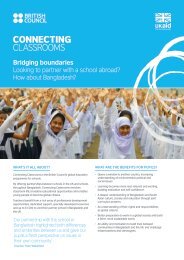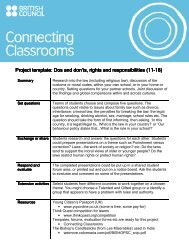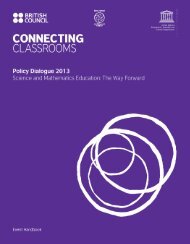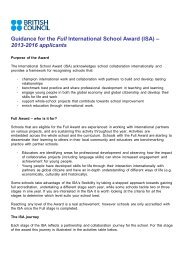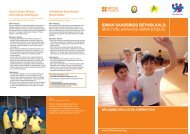Guidance for the Foundation level ISA - British Council Schools Online
Guidance for the Foundation level ISA - British Council Schools Online
Guidance for the Foundation level ISA - British Council Schools Online
Create successful ePaper yourself
Turn your PDF publications into a flip-book with our unique Google optimized e-Paper software.
<strong>Guidance</strong> <strong>for</strong> <strong>the</strong> <strong>Foundation</strong> International School Award<br />
(<strong>ISA</strong>)<br />
Purpose of <strong>the</strong> Award<br />
The International School Award (<strong>ISA</strong>) acknowledges school collaboration internationally and<br />
provides a framework <strong>for</strong> recognising schools that:<br />
· champion international work and collaboration with partners to build and develop lasting<br />
relationships<br />
· benchmark best practice and share professional development in teaching and learning<br />
· engage young people in both <strong>the</strong> global economy and global citizenship and develop <strong>the</strong>ir<br />
skills <strong>for</strong> life and work<br />
· support whole-school projects that contribute towards school improvement<br />
· enrich education through international work.<br />
There are three stages on <strong>the</strong> <strong>ISA</strong> journey: <strong>Foundation</strong>, Intermediate and Full.<br />
<strong>Foundation</strong> <strong>level</strong> – who is it <strong>for</strong><br />
The <strong>Foundation</strong> <strong>level</strong> introduces internationalism and partnership working into <strong>the</strong> school, <strong>for</strong>ming<br />
a foundation <strong>for</strong> future international collaborative work. This is <strong>the</strong> <strong>level</strong> where some schools start<br />
<strong>the</strong>ir <strong>ISA</strong> journey.<br />
· Educators who apply at this <strong>level</strong> are starting to identify areas of practice that <strong>the</strong>y can<br />
improve on.<br />
· Young people who are involved at this <strong>level</strong> are <strong>for</strong>ming an idea of what it is to be a global<br />
citizen.<br />
Some schools take advantage of <strong>the</strong> <strong>ISA</strong>’s flexibility by taking a stepped approach towards gaining<br />
full accreditation, undertaking a different stage each year, while some schools tackle two or three<br />
stages in one year. If you are interested in <strong>the</strong> <strong>ISA</strong> it is worth looking at <strong>the</strong> criteria <strong>for</strong> all <strong>the</strong><br />
stages to determine which <strong>level</strong> suits your school best.<br />
Reaching any <strong>level</strong> of <strong>the</strong> Award is a real achievement; however schools are only accredited with<br />
<strong>the</strong> <strong>ISA</strong> once <strong>the</strong> Full stage is completed.<br />
The <strong>ISA</strong> journey<br />
Each stage of <strong>the</strong> <strong>ISA</strong> reflects a partnership and collaboration journey <strong>for</strong> <strong>the</strong> school. For this stage<br />
of <strong>the</strong> award this journey is illustrated in <strong>the</strong> activities table below.<br />
For <strong>the</strong> complete journey and activity areas <strong>for</strong> international work download <strong>the</strong> full <strong>ISA</strong> journey<br />
table (W ord 75KB).
The <strong>ISA</strong> journey – FOUNDATION <strong>level</strong> activities should reflect each of <strong>the</strong>se areas.<br />
Preparing <strong>for</strong> international work<br />
Global<br />
citizenship<br />
Enriching<br />
education<br />
Young people and educators build an awareness of global <strong>the</strong>mes.<br />
· <strong>Schools</strong> run activities that introduce global <strong>the</strong>mes to young people<br />
· Young people share in<strong>for</strong>mation about <strong>the</strong>ir local context with partners<br />
· Educators identify a need to introduce global citizenship <strong>the</strong>mes in teaching<br />
Educators build awareness of practices in o<strong>the</strong>r schools.<br />
· Educators identify priority areas of practice to improve<br />
· Educators share in<strong>for</strong>mation about education practice with partners<br />
<strong>Schools</strong> prepare <strong>for</strong> International work.<br />
International<br />
school<br />
ethos<br />
· <strong>Schools</strong> audit international activity and assess understanding among young people and<br />
educators<br />
· <strong>Schools</strong> appoint an international co-ordinator and write an international policy<br />
· <strong>Schools</strong> actively seek and prepare to work with international partners<br />
To apply <strong>for</strong> <strong>the</strong> <strong>Foundation</strong> <strong>level</strong> your school will have:<br />
· conducted an audit of international activity already taking place in school<br />
· appointed an international co-ordinator<br />
· written an international policy<br />
· started to look <strong>for</strong>, and be preparing to work with, international partner schools<br />
· completed at least one activity with an international focus<br />
· completed at least one activity with ano<strong>the</strong>r school, ei<strong>the</strong>r in your home country or a<br />
different country<br />
· completed a set of evaluation <strong>for</strong>ms <strong>for</strong> parents, young people, educators and school<br />
visitors <strong>for</strong> one activity and provided reflection on each of <strong>the</strong> collaborative activities<br />
undertaken.<br />
Complete <strong>the</strong> relevant documents offline and keep <strong>the</strong>m <strong>for</strong> your records; <strong>the</strong>y will build into a<br />
portfolio of evidence as you progress through <strong>the</strong> <strong>ISA</strong>. Your application, which you must submit<br />
online, will refer to <strong>the</strong>se documents.<br />
<strong>Foundation</strong> <strong>level</strong> criteria – in more detail<br />
Activities<br />
Describe <strong>the</strong> activities your school has completed <strong>for</strong> <strong>the</strong> <strong>Foundation</strong> <strong>level</strong>. Activities must cover<br />
some of <strong>the</strong> points listed below (1-6).<br />
Impact evaluation<br />
On <strong>the</strong> same <strong>for</strong>m It is important to illustrate <strong>the</strong> impact that <strong>the</strong> activities have had on <strong>the</strong> school,<br />
educators, young people and <strong>the</strong> local or international community, including any relevant learning<br />
outcomes.
Activity requirements<br />
1. Curriculum-based activities<br />
International projects must be part of genuine classroom activity that relates to a National or<br />
local curriculum and should take place during normal lesson time. Projects and clubs carried<br />
out at lunchtime and/ or after school are not usually eligible <strong>for</strong> consideration, unless <strong>the</strong>y clearly<br />
relate to curriculum-based work.<br />
2. Collaborative work with partner schools<br />
You must complete at least one activity with your partner school, but you can record additional<br />
activities as part of your application. Your partner school can be in <strong>the</strong> same country as you or in a<br />
different country.<br />
Every activity should have an international focus, its content should complement <strong>the</strong> National or<br />
local curriculum and it should contribute to improving educational outcomes.<br />
The table below gives fur<strong>the</strong>r advice on what is acceptable in terms of collaborative work.<br />
Activities such as… are acceptable provided that… are not acceptable when <strong>the</strong>re<br />
is…<br />
visits and trips (non<br />
reciprocal). See note<br />
below.<br />
fundraising and<br />
sponsoring<br />
exchanges and work<br />
experience<br />
(reciprocal)<br />
school-to-school<br />
projects<br />
as part of genuine curriculum work<br />
(see 1) young people have<br />
exchanged cultural in<strong>for</strong>mation via<br />
emails and letters with <strong>the</strong>ir peers<br />
in <strong>the</strong> partner school be<strong>for</strong>e and<br />
after <strong>the</strong> visit.<br />
young people are in regular<br />
contact with a school abroad and<br />
<strong>the</strong> content of <strong>the</strong> in<strong>for</strong>mation<br />
exchange has an impact on <strong>the</strong><br />
curriculum/learning. Fundraising<br />
alone is not a suitable activity.<br />
young people have exchanged<br />
cultural in<strong>for</strong>mation via emails and<br />
letters with <strong>the</strong>ir peers in <strong>the</strong><br />
partner school be<strong>for</strong>e and after <strong>the</strong><br />
exchange as part of curriculum<br />
work.<br />
it illustrates <strong>the</strong> impact this activity<br />
has had on young people and<br />
educators in understanding <strong>the</strong><br />
world as a global citizen, through<br />
improved teaching practices or<br />
improved outcomes <strong>for</strong> young<br />
no evidence of young people<br />
exchanging in<strong>for</strong>mation as part of<br />
curriculum work.<br />
no evidence of young people<br />
exchanging in<strong>for</strong>mation as part of<br />
curriculum work.<br />
no evidence of young people<br />
exchanging in<strong>for</strong>mation as part of<br />
curriculum work.<br />
no evidence of reflective learning<br />
or a change of behaviour,<br />
knowledge or outcome in <strong>the</strong>se<br />
areas at individual, classroom,<br />
schools or community <strong>level</strong>.
people.<br />
A note about visits and trips<br />
In-country visits<br />
A trip or visit will not qualify as an activity on its own, but should be included in addition to<br />
curriculum-based projects. (For example, a trip to a place of worship does not count, but as part<br />
of a term-long project on religions of <strong>the</strong> world, it should certainly be included.)<br />
Overseas visits<br />
Ski trips and o<strong>the</strong>r extra-curricular visits, which have no impact on lessons, are not acceptable<br />
as curriculum-based international activities.<br />
3. Global citizenship<br />
Your activities must encourage young people to develop awareness of global <strong>the</strong>mes and explore<br />
<strong>the</strong> differences between <strong>the</strong>ir local community and that of <strong>the</strong>ir partner school. Examples of global<br />
<strong>the</strong>mes include:<br />
· conflict and peace<br />
· sustainable living<br />
· rights and responsibilities<br />
· fairness and equality<br />
· identity and belonging.<br />
For more guidance on global citizenship visit <strong>Schools</strong> <strong>Online</strong>: Connecting Classrooms.<br />
4. Continuous professional development<br />
As well as building awareness and reflecting critically on emerging relationships with partner<br />
schools, educators should illustrate an awareness of alternative practices in <strong>the</strong>ir partner<br />
school. They should also show what changes <strong>the</strong>y have made in <strong>the</strong>ir own pedagogy or<br />
classroom management as a result.<br />
5. Majority of curricular subjects involved<br />
A broad range of subjects could be included in international activities. The teaching of a <strong>for</strong>eign<br />
language is not an international activity when it focuses solely on learning language skills. It<br />
becomes a valid activity when young people learn about <strong>the</strong> country, its customs, geography or<br />
culture and can compare and contrast it with <strong>the</strong>ir own nation.<br />
Reflect <strong>the</strong> breadth of subjects covered in your application.<br />
6. Majority of young people involved
At least one activity must include involvement by <strong>the</strong> majority of young people in <strong>the</strong> school<br />
(above about 75 per cent). Small group visits can only be considered in addition to this first activity.<br />
Whole school activities should illustrate <strong>the</strong> schools leadership in embedding global citizenship at<br />
<strong>the</strong> heart of <strong>the</strong> school.<br />
What does a good partnership look like<br />
Here is our definition of a successful school partnership.<br />
‘A good partnership is sustainable, soundly managed, motivates staff and young people alike, is<br />
supported by senior management, involves <strong>the</strong> wider school community, is integrated into <strong>the</strong><br />
curriculum, strategically planned, addresses global and real issues relevant to local communities,<br />
and contributes to key competence development of educators and young people. All <strong>the</strong>se factors<br />
contribute to <strong>the</strong> development of critical cultural awareness and intercultural learning and<br />
understanding.’<br />
A partnership will flourish if <strong>the</strong> international work is integrated with existing curricula and everyday<br />
classroom activity. W ork that tackles global <strong>the</strong>mes does not necessarily require extra ef<strong>for</strong>t. A<br />
truly embedded approach will make it easier to engage <strong>the</strong> whole school, particularly o<strong>the</strong>r<br />
educators and <strong>the</strong> senior management team, which in turn facilitates international activities across<br />
<strong>the</strong> school.<br />
International School Award team<br />
2012


